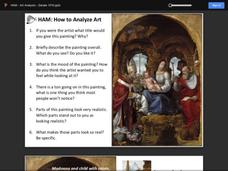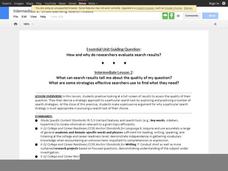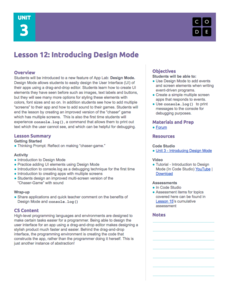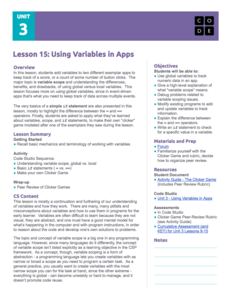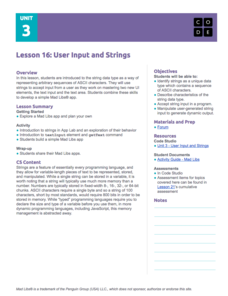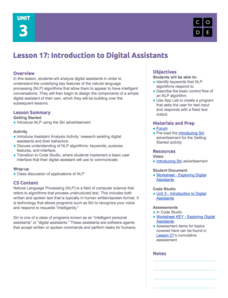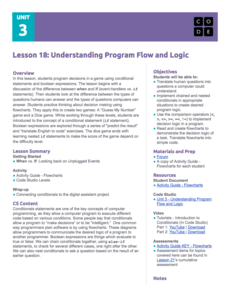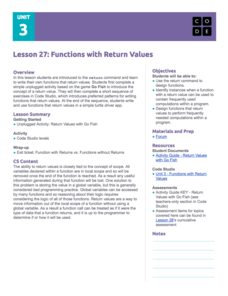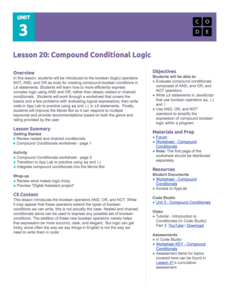Mr. Roughton
The Travels of Marco Polo
Were the stories of Marco Polo's travels and interactions with the Mongols actually true? Using an excerpt from the book The Travels of Marco Polo, your young historians will answer guiding questions to discuss the accuracy and...
Mr. Roughton
How to Analyze Art
How does analyzing art differ from analyzing text? Young historians consider a piece of Italian Renaissance art and practice another type of primary source analysis through a close look and discussion of Bernardo Zenale's Madonna and...
Google
Advanced 2: Understanding Search Results
Effective researchers use a variety of techniques to find what they need online. Pupils who complete the activities listed here should already have an arsenal of strategies for searching. They will learn about and practice two new...
Google
Beginner & Intermediate 5: Evaluating Credibility of Sources
Convey how to determine appropriate and credible online sources with a series of three lessons. After completing the lessons, class members will know what kinds of sources to use, how to identify credible sources, and how tone and style...
Google
Beginner 4: Searching for Evidence for Research Tasks
Having a strong searching skill set can make a research project much easier and much for successful for pupils. Tackle finding evidence with the ideas included here. The ultimate goal is for class members to learn the stepping stones...
Google
Intermediate 2: Understanding Search Results
Teach your class some strategies for effective searching. Pupils should assess the whole results screen and then determine how to go forward with their searches. A table of strategies is included, as is a challenge. After they complete...
Google
Beginner 3: Narrowing a Search to Get the Best Results
Uncover new or more relevant information with the filtering tools in the top navigation bar. First, show your class the tools and demonstrate how to use a few. Next, give class members some time to apply what they have learned. They can...
Curated OER
Sample Lesson 1: Is This Source Credible? Useful? Why and Why Not?
Build background knowledge for The Book Thief by Markus Zusak while teaching your pupils how to determine the credibility of online sources. The plan is designed to take place over the course of two days. On the first day, model how to...
Code.org
Introducing Design Mode
Move beyond buttons when designing user interfaces. In the fourth installment of a 21-part unit, young computer scientists learn to apply design mode, which gives users options for colors, fonts, etc. They learn to incorporate these...
Code.org
Controlling Memory with Variables
Not all variables are created equal. Discover how variables in computer science are different from variables in math class. Scholars learn to work with variables in computer programming by developing a mental model for how variables...
Code.org
Using Variables in Apps
Investigate the benefits of using global variables. The seventh installment of a 21-part unit continues the study of variables from the previous lesson. Young computer scientists modify two existing apps by adding variables and learn how...
Code.org
User Input and Strings
Pupils learn to apply strings in computer science. They master two new user interface elements and also use string type data to represent ASCII characters. Finally, individuals create an app for Mad Libs in the eighth lesson of the series.
Code.org
Introduction to Digital Assistant Project
How does a computer recognize voice commands? Scholars learn about digital assistants and natural language processing (NLP) algorithms in the ninth activity of the series. They begin building a simple digital assistant and work on this...
Code.org
Understanding Program Flow and Logic
Explore decision-making logic in programming computer games. The 10th installment of a 21-part unit teaches scholars how to apply conditional statements and Boolean expressions. They use these concepts to create a "Guess My Number" game...
Code.org
Introduction to Conditional Logic
On one condition ... explore how to use conditionals within conditionals. Scholars apply conditional statements to improve upon the app they built during a previous lesson. They also learn about nested conditionals in the 11th lesson of...
Code.org
Processing Arrays
Scholars use a playing card activity to help them develop a program to find the minimum value of a list. They learn to use for loops to write code that will process lists.
Code.org
Functions with Return Values
Young computer scientists explore how to use the return command in computer programing by playing Go Fish. They learn about functions that return values and then write a turtle driver app using the return function.
Code.org
Canvas and Arrays in Apps
Scholars learn how to make a digital canvas and fill it with artwork by creating a drawing app using the canvas element. The activity requires learners to previous knowledge of arrays and return commands to draw images.
Code.org
Event-Driven Programming and Debugging
Start programming in event-driven style. Scholars learn to place buttons on the user interface and use event handlers. They also learn to recognize errors in code and debug as necessary. This is the second lesson in the series of 21.
Code.org
Image Scroller with Key Events
Discover how to embed images in lists. Scholars modify an existing app to include an image scroller in the 17th lesson plan of the series. They learn to refactor code and remove redundancies after modifying code.
Code.org
Introduction to Arrays
How can you store lists in a computer program? The 16th installment of a 21-part unit introduces arrays as a way to store lists within a variable. Individuals program a list of their favorite things—adding interest to the activity.
Code.org
Beyond Buttons Towards Apps
Explore how people use event-driven programming in games with a activity that teaches scholars to use new screen elements and events. They apply these new elements to create a simple chaser game.
Code.org
Compound Conditional Logic
Scholars explore compound conditional logic and learn to use the Boolean operators AND, OR, and NOT within conditional statements by incorporating these operators to improve a previously created app.
Code.org
While Loops
Bring your pupils in the loop with while loops. Scholars learn how to modify conditional statements to produce while loops in the 14th lesson of the series. They use flowcharts to understand loops and then program some examples of loops.



